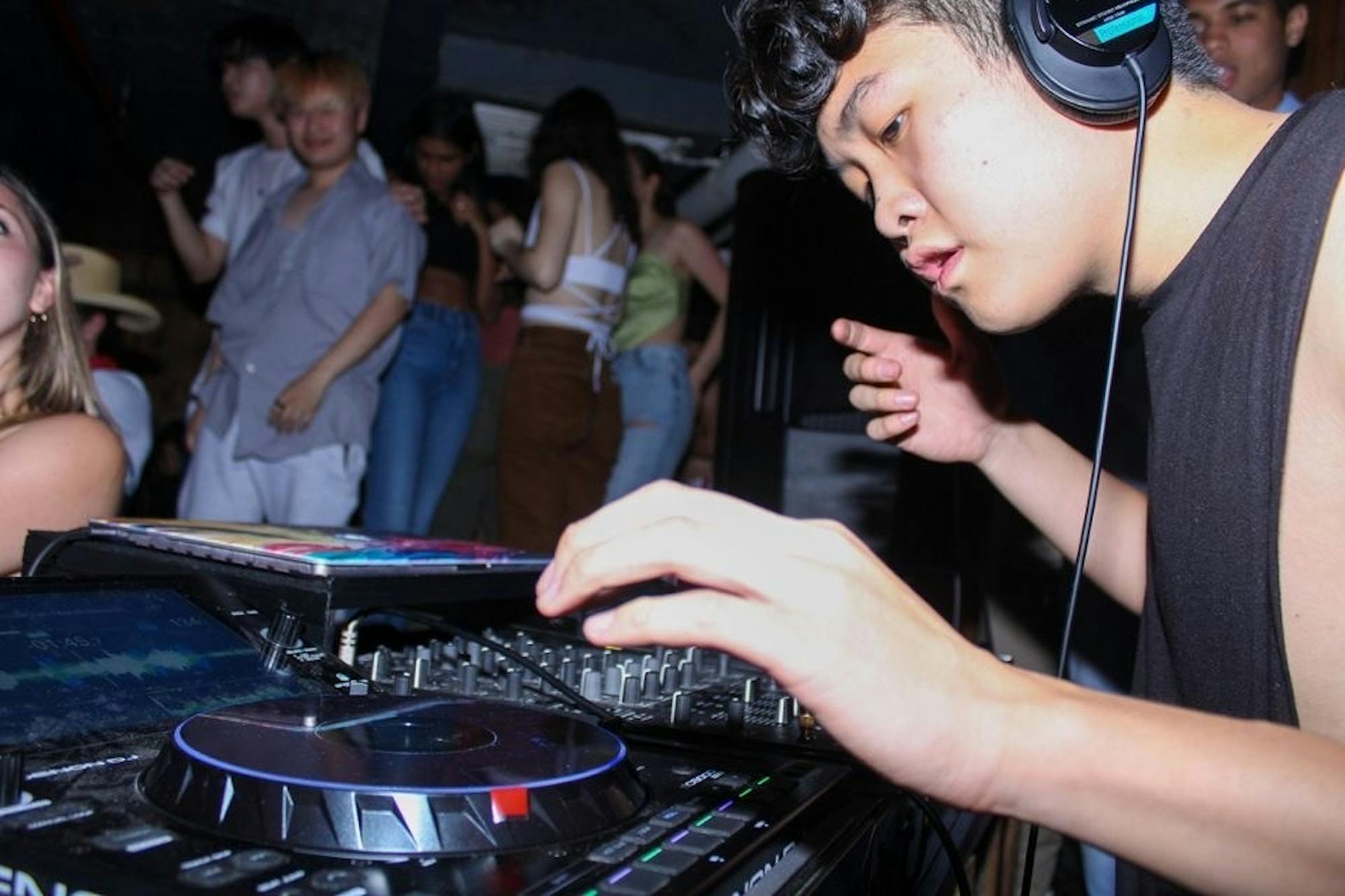Booth, Dartmouth’s DJ collective founded in 2016, is a social and art group that provides DJ services to Greek houses and other functions on campus. The collective is currently expanding their services by branching out to cover more events to fit a growing campus demand for DJs.
“Our main purpose is to provide DJ services … but more than that, we think of ourselves as an art collective on campus,” Booth’s founding member Juhnwi Kim ’22 said. “There’s a very strong DJ culture at Dartmouth [and] we provide high quality service.”
Booth performs primarily at fraternities and sororities, where it is hired for on-nights, semis and formals. It also puts on Booth raves, which are shows typically hosted at Chi Gamma Epsilon and Scarlett Hall.
In addition, Booth performs at campus events, ranging from shows at the Hopkins Center for the Arts and the Thayer School of Engineering to the Friday Night Rock performances at Collis Commonground. A couple weeks ago, the Programming Board hired Booth to play during intermissions at Battle of the Bands, according to Booth’s director, Luis Verdi ’22.
“We’re trying to expand beyond Greek houses. Something that we really value is a relationship with the school,” Verdi said.
The members of Booth all have their own distinct styles, which means that every show is unique and has a different aesthetic. For example, Verdi specializes in dance, pop and electronic dance music, while new member Raegan Padula ’24 said she prefers house and techno.
“We all have different niches that we love to explore in music, and that combined with our ability to get a crowd going is so important to bring new sonic spaces to campus,” Padula said.
Booth also encourages its current members to incorporate new styles. Padula is excited to experiment in her Booth performances over sophomore summer when she returns from London, where she is currently studying electronic music.
“Getting to go around the city and take some of the experimental stuff done here and grunge and grime and bringing those back to campus is going to be really exciting,” Padula said. “[Booth’s] function is to introduce students to new flavors and new styles.”
Despite each member’s niches, Kim said that Booth has a “commercial front,” in which they still play pop music that people recognize and enjoy.
“My favorite thing is just seeing a crowd of people singing the words. To me, there’s nothing cooler as a performer than seeing everyone excited about what you’re putting on,” Verdi said. “Having that liberty to say ‘I'm in control, but I want to make sure that you’re all having fun with me.’ Because it’s about having fun but also making sure everyone else is having fun.”
Booth members meet once a week to discuss upcoming shows and contribute to external projects, such as their SoundCloud account. Padula said that at these weekly meetings, people will bring their boards and mix songs back and forth between each other.
“[This] is a real challenge, especially since some of us have quite different tastes,” Padula said. “To go from hip hop to experimental funk is a really fun switch.”
New members typically join Booth during their freshman year, with a variety of experience levels. Some are experienced DJs, while others simply show interest in getting started. According to Verdi, Booth’s expanding popularity on campus makes it easier to recruit.
“Over the years we've gotten a lot more interest over time,” Verdi said. “It feels cool to have that presence on campus.”
Verdi said he first experimented with DJing in high school, when he taught himself how to play using a friend’s equipment and performed at his school’s dance. He discovered the opportunity to continue his passion for DJing in college through Booth.
“Once I got [to Dartmouth], I felt like [DJing] was something I wanted to get back into and keep working on,” Verdi said. “Once I found out about Booth, met people in Booth, I was completely sold.”
After joining, new members are trained in the winter quarter. According to Kim, winter training consists of mastering techniques and learning how to navigate the Dartmouth music scene.
“We make sure that they are technically proficient enough to perform at a high level that people require and want,” Kim said. “Our members are not only DJs, but they produce and are in bands, so we like to think we are one of the leading musical voices on campus.”
Booth was founded in 2016 by Chris Hogan '19 and PJ O'Sullivan '19 to address the need for a DJ group at Dartmouth. Kim and a group of four '20s then helped get Booth started. Kim said they were inspired by the Boiler Room group, which he said had a “more varied music scene.”
In the beginning, Booth started performing at BarHop, an event held every Thursday at the Hopkins Center for the Arts. Booth then transitioned into DJing fraternity and sorority formals through personal connections. Now, Kim said that Greek houses ask Booth to perform at their events.
In addition to providing DJ services, Booth provides a sense of community for its members. Verdi commented on how the social aspect is his favorite part, and how he still keeps in touch with Booth alumni.
“I have met some of my biggest mentors through Booth,” Verdi said. “Those are really solid relationships we got to build through this shared interest, and I don’t think I would have met them otherwise.”
Correction appended (Apr. 28, 5:33 p.m.): A previous version of this article implied that Kim and a group of '20s founded Booth. They were not the primary founders; Chris Hogan '19 and PJ O'Sullivan '19 founded Booth in 2016, with the help of Kim and four '20s.




